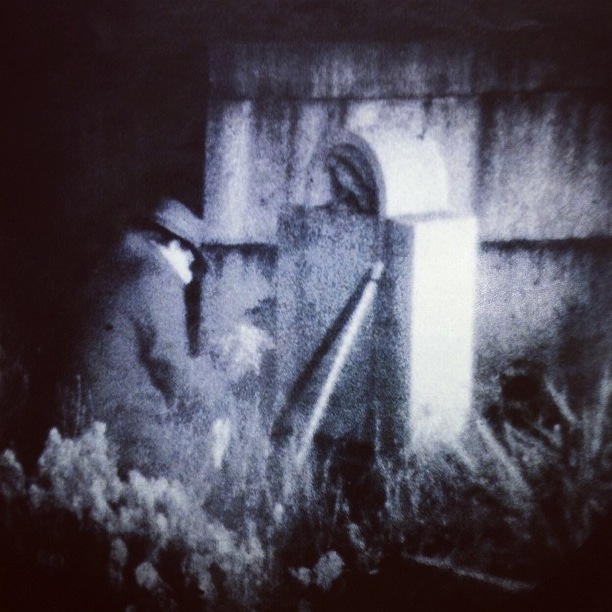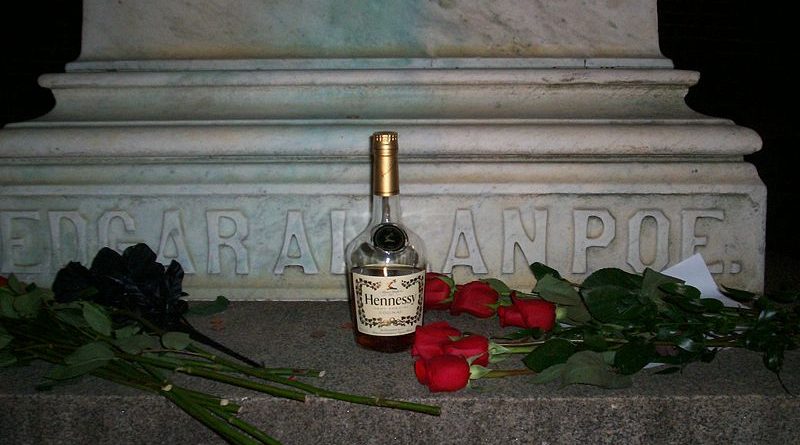Urban Legend of The Poe Toaster – Unexplained Mysteries
The Poe Toaster is the nickname given to a mysterious man who pays annual tribute to Poe by visiting his grave every year. The strange tradition started in 1949 a century are after Poes death, and it occurs every year on the authors birthday (January 19). According to Wikipedia: In the early hours of the morning on that date, a black-clad figure, presumed to be male, with a silver-tipped cane enters the Westminster Hall and Burying Ground in Baltimore, Maryland. The individual proceeds to Poes grave, where he or she raises a cognac toast. Before departing, the Toaster leaves three red roses and a half-bottle of cognac on the grave.
The Toaster wears a black hat and coat and hides his face with a hood or scarf. Groups of reporters and admirers are often on hand to watch the event. There have been no attempts to interfere with the Toaster or to unmask him most likely out of respect for the tradition.
The Poe Toaster is an unofficial nickname given to a mysterious person (or more probably two persons in succession, possibly father and son) who, for over seven decades, paid an annual tribute to American author Edgar Allan Poe by visiting the stone marking his original grave in Baltimore, Maryland in the early hours of January 19, Poe’s birthday. The shadowy figure, dressed in black with a wide-brimmed hat and white scarf, would pour himself a glass of cognac and raise a toast to Poe’s memory, then vanish into the night, leaving three roses in a distinctive arrangement and the unfinished bottle of cognac. Onlookers gathered annually in hopes of glimpsing the elusive Toaster, who did not seek publicity, and was rarely seen or photographed.
According to eyewitness reports and notes accompanying offerings in later years, the original Toaster visited the tomb from sometime in the 1930s (though no report appeared in print until 1950) until his death in 1998, after which the tradition was passed to “a son”. Controversial statements were made in some notes left by the post-1998 Toaster, and in 2006 an unsuccessful attempt was made by several onlookers to detain and identify him. In 2010 there was no visit by the Toaster, nor did he appear in 2011 or 2012, triggering speculation that the 75-year tradition had ended.
Origins
Poe died at the age of 40 in Baltimore on October 7, 1849 under mysterious circumstances. The Poe Toaster tradition may have begun as early as the 1930s, according to witnesses, and continued annually until 2009. Each year, in the early hours of the morning of January 19, a black-clad figure (presumed male), face obscured by a scarf or hood, carrying a silver-tipped cane, would enter the Westminster Hall and Burying Ground in Baltimore. At the site of Poe’s original grave, which is marked with a commemorative stone, he would raise a cognac toast and place three red roses on the grave marker in a distinctive configuration, along with the unfinished bottle of Martell cognac.
The roses were believed to represent Poe, his wife Virginia, and his mother-in-law Maria Clemm, all three of whom were originally interred at the site. The significance of the cognac is uncertain, as it does not feature in Poes works (as would, for example, amontillado). However, a note left at the 2004 visitation suggested that the cognac may have represented a tradition of the Toaster’s family, rather than Poe’s. Several of the cognac bottles are kept at the Edgar Allan Poe House and Museum in Baltimore.
A group of varying size composed of reporters and Poe enthusiasts observed the event each year. A photograph, reputedly of the Toaster, was published by Life Magazine in 1990.
The notes
Cognac and roses found at Poe’s present-day (post-1875) grave on January 19, 2008, likely left by an imitator
On several occasions, the Toaster left a note along with the roses and cognac. Some notes were simple expressions of devotion, such as “Edgar, I haven’t forgotten you.” In 1993, a cryptic message stated, “The torch will be passed.” In 1999, a note announced that the original Toaster had died the previous year and had passed the tradition to “a son.” Subsequent eyewitnesses noted that the post-1998 Toaster appeared to be a younger individual.

The Toaster’s 2004 note was apparently critical of France’s opposition to the war in Iraq: “The sacred memory of Poe and his final resting place is no place for French cognac. With great reluctance but for [sic] respect for family tradition the cognac is placed. The memory of Poe shall live evermore!”
Events leading up to Poe’s bicentenary
In 2006 a group of onlookers unsuccessfully attempted to intercept the Poe Toaster. Aside from that incident, spectators, out of respect for the tradition (and, perhaps, the mystery), have never interfered with the Toaster’s entry, tribute ritual, or departure, nor has any concerted effort been made to identify the individual.
In 2007 a 92-year-old man named Sam Porpora claimed that he had started the Poe Toaster tradition. A former historian for Baltimore’s Westminster Church, Porpora claimed that he invented the Toaster in the 1960s as a “publicity stunt”, to reinvigorate the church and its congregation, and had falsely told a reporter at the time that it had begun in 1949. However, reports of the annual visits date from well before the 1960s, for example a 1950 article in The (Baltimore) Evening Sun that mentions “an anonymous citizen who creeps in annually to place an empty bottle (of excellent label) against the gravestone.”
Porpora’s daughter said she had never heard of her father’s actions but that it fit in with his mischievous nature; but Jeff Jerome of the Edgar Allan Poe Society pointed out that the details of Porpora’s story seemed to change with each telling. “There are holes so big in Sam’s story, you could drive a Mack truck through them,” he said. Jeff Savoye, another officer in the Edgar Allan Poe Society, also questioned Porpora’s claims, but admitted he could not definitively prove or disprove them. While never retracting his claim, Porpora later acknowledged that it was not he making the annual visits, that someone else (he knew not who) had made the tradition his own.
In 2008, Curator Jeff Jerome reported that nearly 150 gathered to observe the Toaster’s appearance. 2009 marked the bicentenary of Poe’s birth; despite this milestone, the crowd was smaller than in past years, and the Toaster left no note. In 2010 the Poe Toaster failed to appear. Jerome, who had witnessed every visitation from 1976 on, had no explanation, but did speculate that if the Toaster intended to end the tradition, the 2009 bicentennial would mark a logical ending point.
The 2011 anniversary saw only the appearance of four impostors (immediately dubbed “faux Toasters”), identified as such because all four walked in clear sight of waiting observers (contrary to the real Toaster’s secretive nature), none gave the secret signal that only Jerome knows a gesture the Toaster predictably made each year at the grave and none arranged the roses in the unique pattern established by the Toaster. Their appearance sparked controversy: While some preferred that the tradition die a “dignified death”, others urged that it be carried on, by imitators if necessary.
In 2012, once again, there was no appearance by anyone identifiable as the “original” Toaster. Jerome (who has denied rumors that he himself was the Toaster) proclaimed the tradition “over with.”



